| Srl | Item |
| 1 |
ID:
174416
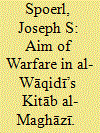

|
|
|
|
|
| Summary/Abstract |
The Kitāb al-Maghāzī or “Book of the Raids” by the early Islamic historian Muḥammad b. ‘Umar al-Wāqidī (ca. 747–823) appeared for the first time in English translation in 2011. The editor and lead translator, Rizwi Faizer, asserts in her introduction (coauthored with Andrew Rippin) that “ … the primary theme that runs through al-Wāqidī’s Maghāzī is that Muḥammad’s battles were always defensive.” The present article shows that this is a misinterpretation of the text. According to the evidence supplied by al-Wāqidī, it is clear that Muḥammad’s military efforts were motivated by far more than mere self-defense. Warfare as Muḥammad practiced and preached it was missionary warfare. Its purpose was to stamp out polytheism, and, more broadly, to destroy a non-Islamic social and political order and to replace it with an Islamic one. The goal of this new order was, in turn, to induce conversion to Islam.
|
|
|
|
|
|
|
|
|
|
|
|
|
|
|
|
| 2 |
ID:
177658
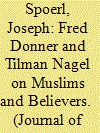

|
|
|
|
|
| Summary/Abstract |
Fred Donner contends that Muḥammad (c. 570–632) led an ecumenical movement of “believers,” a term used frequently in the Qur’ān which Donner defines as a generic term that included Jews and Christians as well as former polytheists who followed Muḥammad’s newly-proclaimed koranic prescriptions. In Donner’s view, only several generations after Muḥammad’s death did this movement come to call itself “Islam” and its members “Muslims” in the sense of a confessional identity over and against Judaism and Christianity. Tilman Nagel argues, to the contrary, that Muḥammad’s movement was neither ecumenical nor inclusive and that it had a distinct confessional identity from the outset with which it self-consciously set itself apart from Judaism and Christianity. For Nagel, “believers” are a subset of Muslims, which was distinguished by their willingness to wage religious war under Muḥammad’s command against polytheists, Jews, and Christians. Nagel’s understanding of the Muslim/believer distinction better accords with the relevant koranic verses than does Donner’s. It also accords far better with the earliest biographies of Muḥammad. Moreover, Nagel’s thesis accounts for all of the data that Donner’s thesis seeks to explain without raising the further problems that plague Donner’s revisionism.
|
|
|
|
|
|
|
|
|
|
|
|
|
|
|
|
| 3 |
ID:
178878
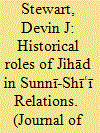

|
|
|
|
|
| Summary/Abstract |
This article provides a taxonomy of the ways in which jihād and jihād propaganda have been used in medieval Islamic history and in modern times within the framework of Sunnī-Shīʿī relations. It identifies five main relevant patterns of usage: I) Sunnī jihād against a Shīʿī foreign power; II) Shīʿī jihād against a Sunnī foreign power; III) Shīʿī use of jihād propaganda against a foreign power – usually a Christian power – as a means to gain legitimacy among Sunnīs; IV) Sunnī-Shīʿī cooperation and solidarity through jihād against a foreign power; and V) Sunnī jihād against an internal, Shīʿī enemy. It then discusses the implications of the continuity of these patterns over many centuries for the understanding of Sunnī-Shīʿī relations generally and critiques some aspects of recent scholarship on “sectarianization.”
|
|
|
|
|
|
|
|
|
|
|
|
|
|
|
|
| 4 |
ID:
191891
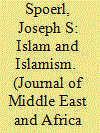

|
|
|
|
|
| Summary/Abstract |
In his 2012 book Islamism and Islam, Bassam Tibi argues that Islamism, a political ideology, is quite distinct from Islam, which he defines as a religion focused on faith and spirituality. This article analyzes and evaluates the six arguments that Tibi advances for this thesis and finds all of them unconvincing. The main problem with Tibi’s case is that it ignores the figure of Muḥammad, whom Islamic sources uniformly portray as someone who fused politics and religion and sought to overthrow a non-Islamic socio-religious order and to replace it with an Islamic one. For mainstream Muslims, Muḥammad is the perfect role model who possessed divinely granted infallibility against sin and error. Due to Muḥammad’s example, as enshrined in classical Islamic sources, Islamists have a strong claim to be following orthodox Islamic principles when they embrace an ideology in which religion and politics are tightly intertwined. The article concludes with some tentative suggestions as to how a Muslim reformer like Tibi might develop more promising arguments for a progressive form of Islam.
|
|
|
|
|
|
|
|
|
|
|
|
|
|
|
|
| 5 |
ID:
148280
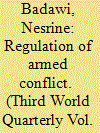

|
|
|
|
|
| Summary/Abstract |
This paper calls for comparative analysis of international humanitarian law and Islamic laws regulating armed conflict by focusing on the underlying assumptions and interests informing both systems (rather than on rule-based comparison). It argues that examination of the biases inherent to each legal system can potentially inform scholars to understand better the paradigms shaping each of them. In doing so, the paper builds on contextual and critical interpretations of both fields of law to assert the need for ‘critical comparativism’ rather than functionalist comparativism. Unlike functionalist comparativism, which treats international law as the ‘objective’ benchmark against which other legal traditions are measured, ‘critical comparativism’ treats the two legal systems examined as alternative manifestations of power structures which, when contrasted against each other, help shed more light on the inherent bias in each legal system.
|
|
|
|
|
|
|
|
|
|
|
|
|
|
|
|